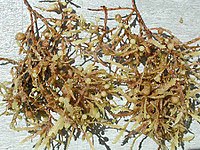
Photo from wikipedia
Hydrogen sulphide (H2S) is a colourless gas with the odour of rotten eggs and has recently been recognized as a signal mediator in physiological activities related with the regulation of… Click to show full abstract
Hydrogen sulphide (H2S) is a colourless gas with the odour of rotten eggs and has recently been recognized as a signal mediator in physiological activities related with the regulation of homeostasis, the vascular system and the inflammatory system. Here we show that H2S donors, including sodium hydrogen sulphide (NaHS), GYY 4137 and diallyltrisulfide (DATS), synergistically enhanced the anti-cancer effect of a green tea polyphenol (−)-epigallocatechin-3-O-gallate (EGCG) against multiple myeloma cells without affecting normal cells. NaHS significantly potentiated the anti-cancer effect of EGCG and prolonged survival in a mouse xenograft model. In this mechanism, H2S enhanced apoptotic cell death through cyclic guanosine monophosphate (cGMP)/acid sphingomyelinase pathway induced by EGCG. Moreover, NaHS reduced the enzyme activity of cyclic nucleotide phosphodiesterase that is known as cGMP negative regulator. In conclusion, we identified H2S as a gasotransmitter that potentiates EGCG-induced cancer cell death.
Journal Title: Scientific Reports
Year Published: 2017
Link to full text (if available)
Share on Social Media: Sign Up to like & get
recommendations!